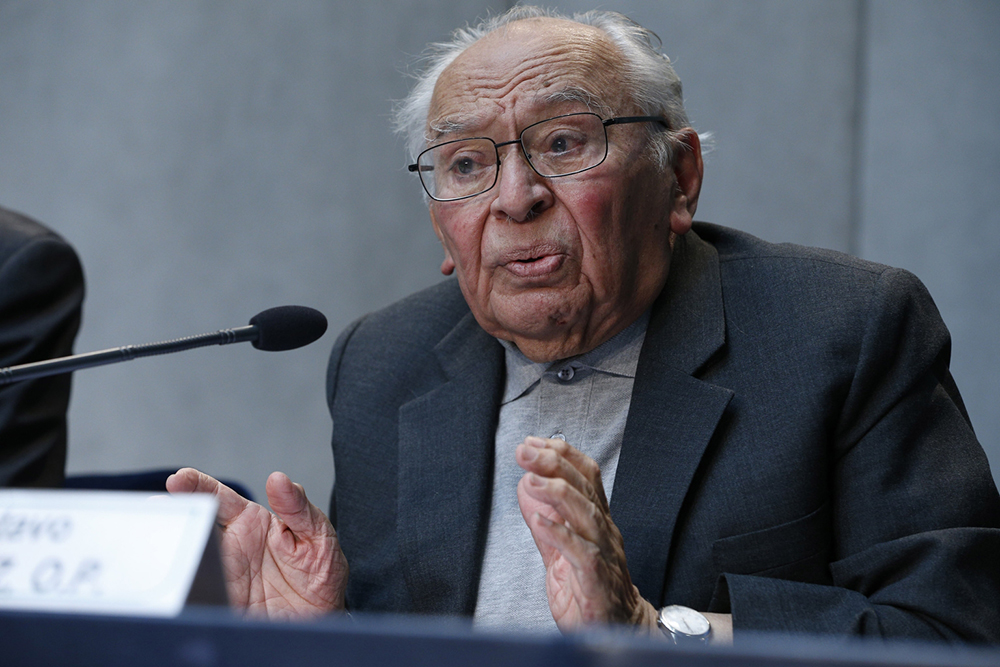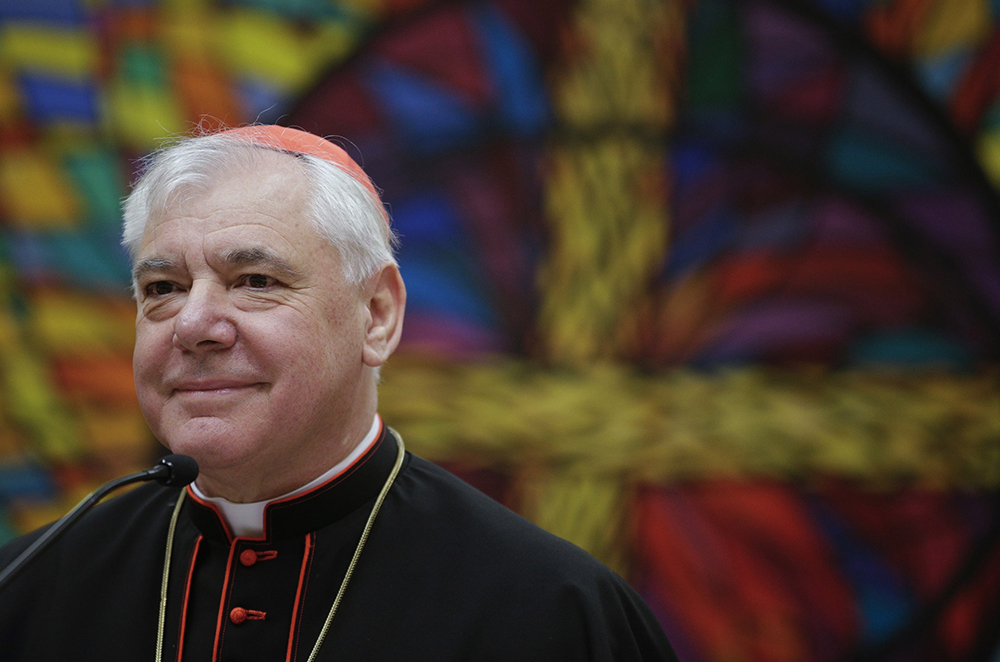
Then-NCR editor Tom Fox and Dominican Fr. Gustavo Gutiérrez at the World Gathering Conference of Liberation Theology held July 14-17, 1988 at Maryknoll School of Theology, Maryknoll, New York. (NCR photo)
Dominican Fr. Gustavo Gutiérrez, who died Oct. 22, was only 37-years-old when he attended the fourth session of the Second Vatican Council in 1965. This experience became a pivotal moment for him and contributed to his development as one of the most influential Catholic theologians of the 20th century.
Gutiérrez, the 5'4" giant of a man, was deeply influenced by Gaudium et spes, a council document which opens with the words: "The joys and the hopes, the griefs and the anxieties of the men of this age, especially those who are poor or in any way afflicted, these are the joys and hopes, the griefs and anxieties of the followers of Christ."
The document, considered one of the council's most important, emphasized the mandate that social necessities should be counted among the "primary duties of modern man." Further, it stated that the church has the right — even the duty — to pass moral judgments on political matters, emphasizing the importance of social justice.
Less than three years after Vatican II, Gutiérrez drafted a revolutionary theological proposal during a conference of priests and laity in Chimbote, Peru. He later presented it as a paper at the General Conference of the Latin American episcopacy, known as CELAM II, or the Medellín Conference, where the Latin American bishops examined their situation in light of the conclusions of the renewal of Vatican II. They gave birth to the first local Catholic theology in modern times at the gathering.

Dominican Fr. Gustavo Gutiérrez speaks at a press conference to introduce the work of the general assembly of Caritas Internationalis at the Vatican May 12, 2015. (CNS/Paul Haring)
At the conference, Gutiérrez linked systemic injustice with a deep understanding of God's preferential option for the poor. Many priests, bishops and cardinals who had drawn inspiration from Vatican II were present at Medellín. Echoing the conclusions at Vatican II, with its call for social justice, they advocated, in the words of Gutiérrez, a commitment to "give preference to the poorest and neediest, and to those who are segregated for any reason."
Medellín helped give birth to the first local Catholic theology in modern times, and it was Medellín that unambiguously asserted the church's "preferential option for the poor," a thought that became the hallmark of liberation theology.
Gutiérrez articulated his ideas in his influential book, A Theology of Liberation, published in 1971. This work offers a biblical analysis of poverty. He contended that the salvation of the poor is not merely a promise for the afterlife; rather, to truly know God, individuals must actively work to eliminate poverty and injustice. He emphasized that the church should address the pressing issues of this world rather than solely focusing on the next.
In an acclaimed book, Gustavo Gutiérrez: Spiritual Writings, Fr. Daniel Groody points to three fundamental principles running through Gutiérrez's writings:
- First, material poverty is inherently evil and must be opposed. It is not merely an opportunity for charity but a degrading force that undermines human dignity and should be resisted and rejected.
- Second, poverty is not a result of fate or laziness; it stems from structural injustices that privilege some while marginalizing others. Poverty is not inevitable; collectively, the poor can organize to facilitate social change.
- Third, poverty is a complex reality that extends beyond its economic dimensions. To be poor means to be insignificant, and poverty often results in an early and unjust death.
Advertisement
Catholic theology, which had remained unchanged for centuries, was experiencing a significant transformation in its methodology following the council, in no small way influenced by Gutiérrez. His theological framework developed as a response to the limitations he observed in traditional Christian theology, especially its dependence on deductive reasoning. This approach often imposed preconceived notions of God onto individuals' lived experiences.
By emphasizing the lived experiences of the oppressed, Gutiérrez advocated for a theological approach rooted in social justice and the specific historical contexts of marginalized communities. A Theology of Liberation urged theologians to prioritize the voices of those suffering under systemic injustice, aligning theological insights with real world struggles.
Gutiérrez emphasized the importance of understanding the true nature of poverty, arguing that it isn't just about the absence of economic resources. He described poverty as "a way of living, thinking, loving, praying, believing, waiting, spending free time, and fighting for life." He highlighted that poverty arises from flawed social institutions. The central question in his work is: "How do we convey to the poor that God loves them?"
Liberation theology was soon giving birth to offspring. In the early 1970s, Asian bishops began to adopt its methodology in their writings, which they called: "A New Way of Being Church." They emphasized the triple dialogue with local cultures, religions and the poor. They described local churches as the "cornerstones" of their reflections.
Catholic women theologians began to integrate liberation theology into their critiques of culture, institutions and the resistance of the Catholic Church hierarchy to reform. Rooted in the broader feminist movement, their approach emphasized the importance of recognizing and addressing the marginalization of women in religious contexts. Feminist theologians such as Rosemary Radford Ruether and Elisabeth Schüssler Fiorenza critiqued traditional interpretations of scripture that perpetuate patriarchal norms, seeking to reframe biblical narratives in ways that empower women.
The election of Pope John Paul II on Oct. 16, 1978, marked a significant turning point in post-Vatican II history. He was the first elected non-Italian pope in 455 years, coming from Poland and held a deep suspicion of anything tinged with Marxist thought. Like other liberation theologians, Gutiérrez drew on Marxist principles, highlighting the importance of praxis — action informed by reflection. Gutiérrez asserted that faith must be active and involved in the struggle for justice, aligning with the Marxist idea that theory must be connected to practical action for societal change.
Although Gutiérrez was never officially sanctioned during John Paul II's pontificate, other theologians who adhered to his line of thought, such as Brazilian theologian Leonardo Boff and Sri Lankan theologian Tissa Balasuriya.
Catholic women theologians began to integrate liberation theology into their critiques of culture, institutions and the resistance of the Catholic Church hierarchy to reform.
Cardinal Joseph Ratzinger, head of the Vatican's Congregation for the Doctrine of the Faith from 1981 to 2005 under John Paul II, issued official critiques of liberation theology in 1984 and 1986. He expressed concern that some theologians had inappropriately mixed Marxist critiques of the global economic system with Catholic theology.
During the 1980s and 1990s, Ratzinger, the future Pope Benedict XVI, acted as John Paul II's doctrinal czar. At the time, John Paul was in a fierce battle to silence prominent church liberals.
"This conception of Christ as a political figure, a revolutionary, as the subversive of Nazareth," the pontiff once said, "does not tally with the church's catechism."
Originally a liberal reformer, Ratzinger pivoted to the right once he became an integrant in the Vatican hierarchy. As prefect of the Congregation for the Doctrine of the Faith, Ratzinger warned against the temptation to view Christianity in an exclusively political light. Liberation theology, he once said, was dangerous as it fused "the Bible's view of history with Marxist dialectics."
When Ratzinger was elected Pope Benedict XVI following the death of John Paul II, he held more supportive views regarding liberation theology and Gutiérrez's contributions. Gutiérrez's resurrection followed Ratzinger's appointment of German Archbishop Gerhard Müller, formerly the bishop of Regensburg, Germany, to lead the Vatican's doctrinal congregation.

German Cardinal Gerhard Müller, doctrinal congregation prefect, smiles as he holds a news conference to unveil his book "Poor for the Poor: The Mission of the Church" in Rome Feb. 25, 2014. The book includes a preface written by Pope Francis and two chapters contributed by Dominican Fr. Gustavo Gutiérrez, whose works once underwent a lengthy critical review by the doctrinal congregation. (CNS/Reuters/Max Rossi)
Before becoming a senior churchman, Müller spent 15 years in Peru every summer, teaching theology in the poorest regions and becoming good friends with Gutiérrez — and something of a convert to liberation theology. He had Gutiérrez write two chapters of a book he published, Poor for the Poor: The Mission of the Church in 2014. Following Gutiérrez's death, Müller was among the many who mourned the passing, referring to him as "one of the great theologians and Catholic personalities of our time."
However, Gutiérrez was not fully reconciled with the Vatican until Cardinal Jorge Mario Bergoglio was elected as Pope Francis in March 2013. Francis' insistence that the church be "for the poor" and his criticisms of capitalism and consumerism has gone a long way to rehabilitate the liberation theology movement and incorporate it within the church. Experts point, too, to Francis' decision to name Oscar Romero, the iconic Salvadoran archbishop who was assassinated by rightwing death squads in 1980, as a martyr and saint as another sign of the resurgence in liberation theology.
Six months after becoming pope, Francis met privately with Gutiérrez and Müller at the Domus Sanctae Marthae, the guesthouse where the pontiff resides, and the three celebrated a Mass together.
Referring to that meeting, in a question-and-answer session with members of the Jesuit order in Panama in January 2019, Francis joked that if someone from decades ago had predicted that such an event would ever occur, "they would be taken as a drunk."
I had the pleasure of meeting Gutiérrez on two occasions, and each time I was struck by his magnetic personality. He radiated warmth in an unassuming manner and was quickly open to strangers. During our interactions, we discussed mutual friends and my connection to NCR, which seemed to delight him even more. It didn't take long for me to feel like we were longtime friends.








